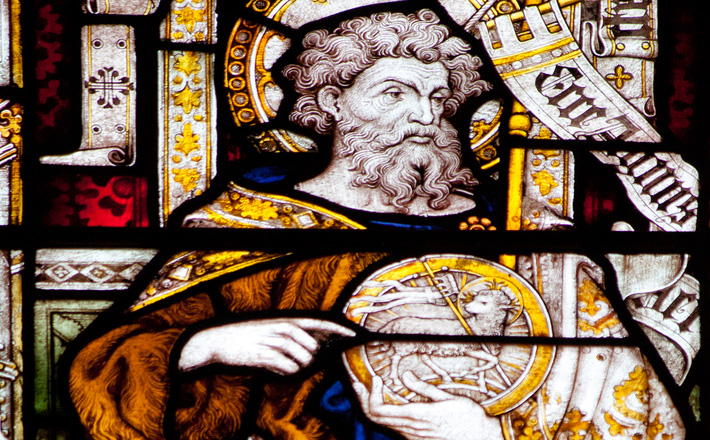Commentary on Psalm 40:1-11
The lectionary selection from Psalm 40 includes ten verses that express thanksgiving (verses 1-10) and one verse of petition for help (verse 11).
The shift from thanks to plea represents a major problem of interpretation in this psalm. In Psalm 40:1-10 the psalmist recounts being delivered from trouble, established securely, and given reason to praise the Lord. Scholars typically classify this first portion of the psalm as a song of thanksgiving.1
Verses 12-17, however, have all the characteristics of an individual lament. This leads many to conclude Psalm 40 consists of two originally distinct psalms. Adding to this perception is the fact that Psalm 40:13–17 appears again in the Psalter as Psalm 70. Thus, it seems logical to conclude the psalmist borrowed Psalm 70 to form the present ending of Psalm 40 with verses 11-12 linking the two sections.
Whatever the history of Psalm 40’s composition, it makes sense to treat the psalm as a unity and verses 1-11 make sense as a lectionary selection. The subject of verse 11 is the Lord’s steadfast love (?esed) and faithfulness (aman) for which the psalmist gives thanks in verse 10: “I have not concealed your steadfast love and your faithfulness from the great congregation.” The Old Testament presents “steadfast love” and “faithfulness” as central features of God’s character (see Exodus 34:6; verse 11 also adds “your mercy” [ra?am] that also appears in Exodus 34:6). The psalm gives thanks for these gifts and also pleads for more.
In verses 1-3 the psalmist recalls a past petition and the lord’s gracious response. The testimony, “I waited patiently for the Lord,” indicates the psalmist did what numerous psalms encourage (Psalms 25:3, 21; 27:14; 37:34; 39:7).2 “Waiting” is an expression of trust and reliance on God. For the psalmist, this faithful waiting leads to God’s salvation.
Through the experience of salvation, the lord puts a “new song” in the psalmist’s mouth, a song of praise that testifies to the lord’s goodness. By singing this song, the psalmist leads others to trust in God’s salvation (verse 3). The next two verses contain a beatitude (verse. 4-5) that exhorts trust in God as the way to live that yields blessing and contentment.
Verses 6-8 raise a question about appropriate worship. The thanksgiving section of the psalm (verses 1-10) could have provided liturgy to accompany a thanksgiving offering (see Psalm 30; Leviticus 3; 7:11-18). But verses 6-8 seem to reject such an offering: “sacrifice and offering you do not desire” (verse 6). The Old Testament elsewhere critiques sacrifice, but never rejects it outright (Psalms 50:7-15; 51:15-17; 69:30-33; Amos 5:22; Isaiah 1:11; Jeremiah 7:22).
Verses 7-8 may intend to present an alternative to the sacrifice, namely, the psalmist’s written testimony in gratitude for deliverance: “in the scroll of the book it is written of me. I delight to do your will, O my God; your law is in my heart.” The “scroll of the book” is somewhat obscure, but it may refer to the psalmist’s testimony in written form, presented in the temple. The psalmist essentially presents himself as a “living sacrifice” (Romans 12:1-2).3 Verses 9-10 advance the claim of this testimony in the congregation gathered for worship.
Verses 7-8 are important in the larger context of the book of Psalms. The word for “delight” (?apa?) in relation to torah is the same word that appears in Psalm 1: 2 which says of the righteous that “their delight is in the law of the lord.” This combination of words occurs only in these two places in the Psalter. Thus, Book I of the Psalter (Psalms 1-41) begins and ends (or nearly so) with this distinctive emphasis on torah-obedience as a sign of faithfulness to God. The one who speaks in Psalm 40:1-11 is one of the righteous, one who Psalm 1 describes and whose way of life it commends.
What about the shift to petition in verse 11? We should note that this kind of rhetorical development appears in numerous other psalms (see Psalms 9-10; 27; 44; 74; 89). The move from thanksgiving to petition is a reminder of the context of suffering that shaped the Psalter. Clinton McCann says it well: “whether individually or corporately, we always pray out of need, at least in the sense that no deliverance is final in this mortal life.”4 Indeed, the thanksgiving for God’s steadfast love in verses 1-10 appears appropriately in a context in which the psalmist still needs to call for hesed.
The Irish rock band U2 provides an artistic expression of McCann’s point about the move from thanksgiving to lament. On their 1985 album “War” they included a song called “40,” the lyrics of which they took from Psalm 40:1-3. The song begins with an adaptation of verses 1-2 which recount the psalmist’s wait for salvation (“I waited patiently for the Lord”) and Lord’s deliverance (“He drew me up from the desolate pit;” “he set my feet upon a rock”). It then goes to a chorus influenced by verse 3 (“He put a new song in my mouth”).
But then the song includes a line that is not part of Psalm 40: “How long to sing this song?” These words echo a line in the first song on the album, “Sunday, Bloody Sunday,” which laments a horrific day of violence during “the Troubles” in Northern Ireland.5 The album ends in thanksgiving spoken with the awareness of continuing pain and suffering. This rendition of Psalm 40:1-3 is true to the psalm as a whole and to the Psalter as a whole. It is a song of thanksgiving that recognizes the ongoing trouble in the world and the need for salvation.
Notes:
- Hans-Joachim Kraus, Psalms 1-59: A Continental Commentary (trans. Hilton C. Oswald; Minneapolis: Fortress Press, 1993), pp. 423–424.
- J. Clinton McCann, Jr. “The Book of Psalms,” in The New Interpreter’s Bible (ed. Leander Keck; Nashville: Abingdon Press, 1996): 4:842.
- James Luther Mays, Psalms (Interpretation: A Bible Commentary for Teaching and Preaching; Louisville: Westminster John Knox, 1994), p. 168.
- McCann, NIB, 4:884.
- U2, “War,” Island Records 262051CID112, 1983, Album.


January 15, 2017